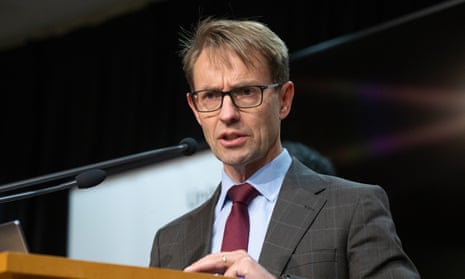The understated doctor who became an unexpected star of New Zealand’s pandemic has resigned after two years leading the country’s Covid response.
Dr Ashley Bloomfield, New Zealand’s director-general of health announced his resignation on Wednesday, and said that it had been “a huge privilege”.
“It’s a complex and challenging role at any time, and the last two years I don’t think could have been more complex and challenging,” Bloomfield said. “I’ve been thinking for a while about what’s the right time for me to step down. It seems we’re at a good point in terms of the pandemic, the response is shifting [and] I’m also confident that the system is in good hands.”
Bloomfield was a softly-spoken public servant who became a household name, meme, and often-beloved, sometimes-controversial public figure as the country grappled with its first two years of Covid-19. During significant outbreaks, the doctor was a calm and regular fixture on television, providing daily live-streamed updates on case numbers, infections and transmissions. His presence was such a constant as the country reeled from its first waves of infections that it made headlines when he took his first day off.
Bloomfield became synonymous with New Zealand’s Covid response, and its success in the first stages of the pandemic in eliminating the virus and continuing normal life. While the country is now experiencing widespread Covid-19 outbreaks, high vaccination rates mean it has maintained some of the lowest death rates in the world. The doctor’s prominence was perhaps itself a reflection of the country’s focus on placing the advice of scientists at the heart of its Covid response, at a time when some other countries had focused on political leadership while sidelining public health officials.
“There’s not many public servants I have got to know as well as Dr Ashley Bloomfield,” prime minister Jacinda Ardern said in a tribute to the director-general’s tenure. “He has been central to our Covid success as a nation, and he’s done it with humour and grace”. Ardern has occasionally referenced Bloomfield poking fun at her as she tackled her own epidemiological learning curve, and said “I’ll keep the details of his sporadic mockery of me to myself”.
“In every sense of the word – through his tireless dedication, his focus on people, his calm and considered approach – he has been a true public servant,” she said.
Bloomfield provided New Zealand with moments of humour as well as epidemiological updates. Occasionally, his conferences provides fodder for a wave of memes: including for responding with a long, blinking silence when asked questions about then-US president Donald Trump’s speculation that people should inject themselves with bleach to cure coronavirus infection; or about Instagram influencers’ assertions that Covid was caused by 5G.
He became a point of pride and fascination for some New Zealanders: shops sold mugs and tea towels emblazoned with his likeness and a petition was launched to name him New Zealander of the year. His fame grew as his public health announcements were set to dubstep at a music festival, informal fanclubs appeared online, and he became inspiration for some ill-advised fanfiction, including a romance novella.
“When we spoke about his decision to move on, he mentioned that he wanted to spend time with his family, and that’s the least we owe him,” Ardern said. According to local media outlet Stuff, Bloomfield “worked 12-hour days, up to seven days a week, through much of the pandemic”.
Speaking to media on the afternoon of his resignation, Bloomfield spent his prepared remarks discussing the evidence for booster shots and other public health measures as winter approaches, and encouraging parents to ensure their children’s vaccinations were up to date.
Asked by reporters about his tenure and the way New Zealanders had responded to him, he said, “throughout the last two years I’ve heard from New Zealanders all across the country, a huge number of messages of gratitude and support - not for me for me and my role but for the work that our team has done… through those very tough times and as I sat down and steeled myself to ring the minister at all hours of the day and night, [that’s] one of the things that’s carried me through and I know it’s carried my staff through.”
Asked for his highlight of the past two years he said, “high vaccination rates”. Asked if he had any thoughts of running for parliament, he said, emphatically, “Not a jot.”
Bloomfield’s tenure at the helm of the ministry of health has not been without controversy - the ministry has faced criticism for its failure to quickly implement programs using mental health funding, and for editing down mental health reports. The ministry also faced a court case over not sharing Māori Covid-19 vaccination data with health providers, and criticism for racial inequities in the Covid response.
Bloomfield will step down at the end of July 2022, the public service commission confirmed in a statement.
“Dr Bloomfield has demonstrated remarkable resilience and courage in leading the health system’s overall response to Covid-19. That response has saved lives,” Public Service Commissioner Peter Hughes said. “I know many New Zealanders will also be thankful for the job he has done.”
